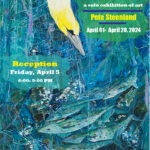
Mama’s Don’t Let Your Babies Grow Up to Be Lifeguards…
Well, maybe that would be okay, but just make sure they don’t get bad sunburns along the way. May is Skin Cancer Prevention and Detection Month, and the fact is skin cancer is a growing problem and almost 100% avoidable if proper precautions are taken.
Think of five people you know… mothers, brothers, sisters, friends, dads… now consider that one of those five will suffer from skin cancer in their lifetime. It is that prevalent. According to the Skin Cancer Foundation, over the past 30 years, more Americans have had skin cancer than all other types of cancer combined.Nearly 3,000,000 people are diagnosed with Basal Cell Carcinoma annually while another 700,000 are diagnosed with Squamous Cell carcinoma which results in 2,500 deaths.
It is extremely important to make sure children are properly protected as one or more blistering sunburns in childhood or adolescence more than double a person’s chances of getting skin cancer. Even less severe sun-burns are dangerous as five or more sunburns at any age also doubles the chances. 
According to Todd Anderson, sales director at Melbourne based Absolutely Natural, the proliferation of very high sun-screens has not helped. “It is unfortunate that the industry is publicizing very high sun-screen values of SPF 75 or even SPF 100. In my opinion it lulls people into being less diligent in the sun as they think they are protected all day long. As the father of two small children, I know that the right product and correct application are crucial.”
Anderson, of course, is partial to Absolutely Natural’s all natural, mineral sunscreens that provide full spectrum protection while being gentle on the skin and environment. Danny Richards has been working for the company for 10 years and emphasizes that proper hydration is critical during sun exposure and after. “The key is proper protection in the sun and even more importantly, application of healing aloes after sun exposure,” Richards points out. “We have a product called Rosehip Aloe that hydrates and helps heal the skin so your sun exposure can turn into a nice tan. Of course, this works best when your sun exposure is moderate; you don’t want a sunburn.”
Absolutely Natural has been marketing their product for 20 years in the harshest of environments mostly at tropical resort hotels. They have developed a protocol for recommending sun care products and that includes different strength products for different parts of the body. “We recommend a higher SPF on sun sensitive areas like our SPF 25 while the rest of the body can use a more moderate product like our SPF 15 or even SPF 8,” Richards explained. Sun sensitive areas of the body are defined by the company as anywhere the bone is close to the skin.
According to the company, the biggest mistake made is in the application. “You never rub the sunscreen quickly into the skin,” Anderson said. “If you do, you can reduce or even negate the SPF value. Instead you ‘dab’ the product on sun sensitive areas and ‘lay’ it everywhere else. Wait for a minute until smoothing it into the skin and that way you have the protection you need.”
While protecting people in the sun is the paramount goal of Absolutely Natural, the company also works to protect the environment. Lindsey Barber has been with Absolutely Natural for seven years and has helped implement programs with the Brevard Zoo and the Turtle Preservation Society. “Not only do our products work better than chemical laden ones, but we are friendly to the environment as well,” Barber said. “Our sunscreens do not have the high estrogen level of chemicals nor the other potential toxic raw materials. They biodegrade quickly and do not harm the coral reefs.”
Keep skin cancer away…
As summer approaches, so does swimsuit season. That might mean trying to lose a few pounds, tone up a bit, get a great pedicure or shop for the perfect bathing suit. But May is also Skin cancer Prevention and Detection month, and as we prepare other parts of our bodies for even more exposure, it’s a great time to examine and prepare our skin as well. Performing a skin exam on yourself or with a partner should be a monthly routine, but if you’re never done it before, may is the perfect time to start.
Basal cell carcinoma is the most common form of skin cancer with an estimated 2.8 million cases diagnosed this past year. These skin cancers can look like open sores that don’t heal within a few weeks, a reddish patch, a shiny bump, a pink growth, or a scar-like area that appears without injury. If you see a suspicious spot, see a dermatologist.
Ninety percent of skin cancers are thought to be associated with past exposure to the sun’s ultraviolet rays but it is never too late to start taking precautions. If you are going to be spending time in the sun, apply a thick layer of sunscreen, preferably containing the ingredients zinc oxide and titanium dioxide. A wide-brimmed hat, sunglasses, and cover-up clothing will also help protect your skin.
Chances are you’ve heard these tips before, but there’s one skin cancer fighting tip you may not be as familiar with topical antioxidants. Antioxidants fight free radicals in an attempt to counteract the skin damage that happens when tissue oxidizes. This damage can lead to aging and changes in DNA and cells that can make tissue more cancer prone. Topical antioxidants reduce this damage to skin.











